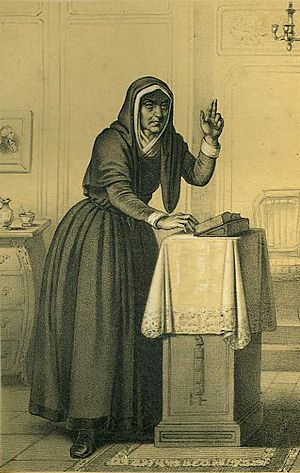Catherine Théot facts for kids
Catherine Théot (born in Barenton, Normandy, France in 1716; died September 1, 1794) was a French woman who believed she could see the future and had special messages from God. She became well-known when people accused her of being part of a plan to go against the government. Her prophecies were even linked to the downfall of a powerful leader named Maximilien de Robespierre.
Early Life and Beliefs
Catherine Théot grew up in a farming family. From a young age, she experienced what seemed like hallucinations, seeing or hearing things that weren't there. She spent time in a religious community in Paris called the Miramiones. After this, her mind was not always clear.
In 1779, Catherine began to declare that she was the Virgin Mary, a "new Eve," and even the mother of God. She was held in a hospital for a few years but was released in 1782. For the next twelve years, not much is known about what she did. However, she eventually settled in Paris and started to gather a small group of people who believed her special messages. She truly believed she was meant to be the mother of a new savior, and her followers called her the "Mother of God."
The Theotist Group
Catherine Théot taught her followers that God had allowed the French Revolution to happen in 1789. She also said that the new laws made by the government were inspired by God. This meant that if you didn't obey the government, you were also not obeying God.
She shared these ideas in small meetings, usually with about fifteen women, at a friend's house. Most of the women who followed her were ordinary people. However, some important people also came to her for prophecies, including friends of the former Duchess of Bourbon. These friends even helped publish a "prophetic journal" about Catherine's visions.
Robespierre and the Theotists
Catherine's followers saw Maximilien de Robespierre, a very powerful leader during the French Revolution, as a special person who would help humanity. They even started preparing for a special ceremony for him.
However, Robespierre had many enemies. These enemies didn't like his religious ideas and used his connection with Catherine Théot to try and get rid of him. This situation became known as the "Catherine Théot affair" in 1794.
On June 15, 1794, a man named Marc-Guillaume Alexis Vadier told the National Convention (the French government at the time) that Catherine Théot and her group were planning to overthrow the Republic. He accused them of being part of a dangerous plot.
Later, on July 27 (known as 9 Thermidor in the revolutionary calendar), Vadier claimed that a letter was found under Catherine Théot's mattress. This letter supposedly said that Robespierre was like John the Baptist for a new religion. It's very likely this letter was made up. But it was used as a way to accuse Robespierre because of his connection to Catherine and his own new religious ideas, called the Cult of the Supreme Being.
Because of these accusations, Catherine Théot and some of her followers were arrested. Their case went to a special court. Even though the accusations were serious, Catherine and her followers were eventually found not guilty and set free. Sadly, Catherine Théot died in prison about a month after Robespierre was executed.
See also
 In Spanish: Catherine Théot para niños
In Spanish: Catherine Théot para niños
 | George Robert Carruthers |
 | Patricia Bath |
 | Jan Ernst Matzeliger |
 | Alexander Miles |


